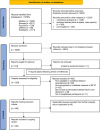The interrelationship between multiple long-term conditions (MLTC) and delirium: a scoping review
- PMID: 38965032
- PMCID: PMC11223896
- DOI: 10.1093/ageing/afae120
The interrelationship between multiple long-term conditions (MLTC) and delirium: a scoping review
Abstract
Introduction: Delirium and multiple long-term conditions (MLTC) share numerous risk factors and have been shown individually to be associated with adverse outcomes following hospitalisation. However, the extent to which these common ageing syndromes have been studied together is unknown. This scoping review aims to summarise our knowledge to date on the interrelationship between MLTC and delirium.
Methods: Searches including terms for delirium and MLTC in adult human participants were performed in PubMed, EMBASE, Medline, Psycinfo and CINAHL. Descriptive analysis was used to summarise findings, structured according to Synthesis Without Meta-analysis reporting guidelines.
Results: After removing duplicates, 5256 abstracts were screened for eligibility, with 313 full-texts sought along with 17 additional full-texts from references in review articles. In total, 140 met inclusion criteria and were included in the final review. Much of the literature explored MLTC as a risk factor for delirium (n = 125). Fewer studies explored the impact of MLTC on delirium presentation (n = 5), duration (n = 3) or outcomes (n = 6) and no studies explored how MLTC impacts the treatment of delirium or whether having delirium increases risk of developing MLTC. The most frequently used measures of MLTC and delirium were the Charlson Comorbidity Index (n = 98/140) and Confusion Assessment Method (n = 81/140), respectively.
Conclusion: Existing literature largely evaluates MLTC as a risk factor for delirium. Major knowledge gaps identified include the impact of MLTC on delirium treatment and the effect of delirium on MLTC trajectories. Current research in this field is limited by significant heterogeneity in defining both MLTC and delirium.
Keywords: delirium; epidemiology; multiple long-term conditions; older people; scoping review.
© The Author(s) 2024. Published by Oxford University Press on behalf of the British Geriatrics Society.
Conflict of interest statement
None declared.
Figures
Similar articles
-
Multiple long-term conditions, loneliness and social isolation: A scoping review of recent quantitative studies.Arch Gerontol Geriatr. 2024 May;120:105347. doi: 10.1016/j.archger.2024.105347. Epub 2024 Jan 26. Arch Gerontol Geriatr. 2024. PMID: 38309103
-
Implementation of hospital-initiated complex interventions for adult people with multiple long-term conditions: a scoping review.BMC Health Serv Res. 2025 Feb 21;25(1):290. doi: 10.1186/s12913-025-12424-2. BMC Health Serv Res. 2025. PMID: 39980012 Free PMC article.
-
A scoping review of clusters of multiple long-term conditions in people with intellectual disabilities and factors impacting on outcomes for this patient group.J Intellect Disabil. 2023 Dec;27(4):1045-1061. doi: 10.1177/17446295221107275. Epub 2022 Jun 13. J Intellect Disabil. 2023. PMID: 35695384 Free PMC article.
-
Beyond the black stump: rapid reviews of health research issues affecting regional, rural and remote Australia.Med J Aust. 2020 Dec;213 Suppl 11:S3-S32.e1. doi: 10.5694/mja2.50881. Med J Aust. 2020. PMID: 33314144
-
Multiple Long-Term Conditions (MLTC) and the Environment: A Scoping Review.Int J Environ Res Public Health. 2022 Sep 13;19(18):11492. doi: 10.3390/ijerph191811492. Int J Environ Res Public Health. 2022. PMID: 36141763 Free PMC article.
Cited by
-
The role of diabetes mellitus on delirium onset: a systematic review and meta-analysis.Cardiovasc Diabetol. 2025 May 19;24(1):216. doi: 10.1186/s12933-025-02782-w. Cardiovasc Diabetol. 2025. PMID: 40390076 Free PMC article.
References
-
- The Academy of Medical Sciences . Multimorbidity: A Priority for Global Health Research. Academy of Medicine Sciences, London, UK, 2018.
-
- Khunti K, Sathanapally H, Mountain P. Multiple long term conditions, multimorbidity, and co-morbidities: we should reconsider the terminology we use. BMJ 2023; 383: p2327. - PubMed
-
- Barnett K, Mercer SW, Norbury M, Watt G, Wyke S, Guthrie B. Epidemiology of multimorbidity and implications for health care, research, and medical education: a cross-sectional study. Lancet 2012; 380: 37–43. - PubMed
Publication types
MeSH terms
LinkOut - more resources
Full Text Sources
Medical
Miscellaneous



